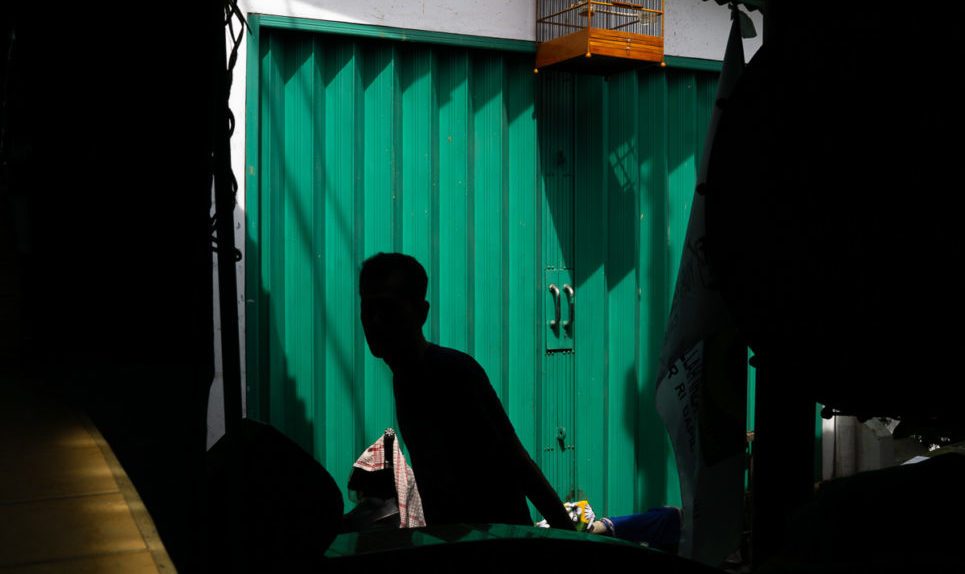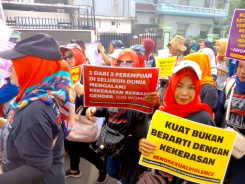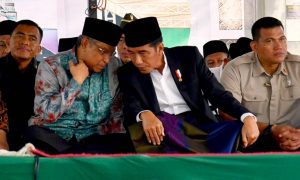Traditionally, politicians are guarded about divulging details of personal struggles with mental health. In Indonesia, aib—which roughly translates as “disgrace” or “shame”—is a word often thrown about when referring to the stigma that mental illness carries. One is forbidden to disclose their family’s aib.
It therefore came as a surprise to me and many other Indonesians when the then-vice governor of Jakarta, Sandiaga Uno, acknowledged that some members of his family—particularly his father, Razif “Henk” Uno—have sought mental health care. This public admission was seen as a positive step towards the destigmatisation of seeking mental health care, which was appreciated by mental health advocates.
More recently, as Prabowo Subianto’s vice-presidential candidate, Sandiaga was able to draw mental health issues into his campaign. Speaking to a crowd of young voters while on the campaign trail in Bandung in March 2019, he raised the issue of youth depression, remarking that:
“Millennials as a demographic bonus, the assets of our nation, must be taken care of. And the problems of health such as the threat of drugs, and the depressive disorder which occurs in young souls—souls which are now the future of Indonesia—must be overcome. A young soul is a healthy soul. So, we must have the capacity for early detection and management to overcome depressive disorder and drug abuse among youth.”
Unfortunately, the use of a political strategy that includes support for mental health advocacy seems to be isolated to Sandiaga Uno. In the WHO’s definition, the goal of mental health advocacy is “to promote the human rights of persons with mental disorders and to reduce stigma and discrimination”. During the 2019 Indonesian general election, the exact opposite took place. The stigmatisation of mental illness and people with mental illness was amplified in political party campaign rhetoric and by hoax-based scare campaigns. Discrimination against people with mental illness was rampant, with senior politicians calling into question their right to vote.
In the election’s aftermath, advocacy for policy change is being complicated by partisan polarisation and religious identity politics. The building blocks of a better mental health care system are there, primarily in the form of Indonesia’s National Health Insurance (Jaminan Kesehatan Nasional/JKN) system, and the ambitious but largely unimplemented Mental Health Law passed in 2014. Real progress, though, will require the re-elected Jokowi administration to show more political leadership, and commit more resources, if adequate mental health care is to be made available to the many millions of Indonesians who are in need of it.
Mental illness and the politics of fear
During the 2019 election, Indonesians living with mental illness fell victim to “post-truth” politics. The portrayal of people with mental health issues was part of a broader trend in Indonesia of scapegoating which, while still focused on traditional targets such as ethnic Chinese Indonesians and communists, now extends to the exploitation of the mentally ill as fodder for scare campaigns.
In early 2018, rumours spread on social media that there was a systematic series of lethal assaults—45 incidents in total—against ulama, or Islamic community leaders. The perpetrators, according to the stories, were politically motivated individuals who, when caught, falsely claimed to have a history of severe mental disorders as an alibi.
Yet a police investigation discovered that out of the 45 allegations made viral in the circulating news, only three unrelated violent incidents did occur. All three incidents’ victims were indeed local religious leaders, one of whom died. All three attacks also coincidentally involved people with a history of severe mental health problems. A later investigation found that the rumour of a systematic wave of attacks was circulated by Muslim Cyber Army, a notorious social media channel opposed to President Joko Widodo (Jokowi). Muslim Cyber Army members who were linked to the creation and spreading of this and other hoaxes were eventually prosecuted.
But it was too late. The hoax succeeded in its goal of morally galvanising grassroots Islamic leaders to unite against “terror” by unknown aktor intelektual (“intellectual actor[s]”, or mastermind[s]), and had real impact upon vulnerable Indonesians: at the height of the scare, alarmed city officials started enacting raids against people roaming the streets with suspected mental illness.
The vilification continued through sensational campaigning, too. The Islamic party PKS launched a campaign video advertisement that offensively depicted a mentally ill individual stealing a truck and kidnapping a woman. Bagus Utomo, the founder of KPSI (Kelompok Peduli Skizofrenia Indonesia or Indonesian Schizophrenic Care Community), had a big role in starting a subsequent petition calling for a stop to the exploitation of those afflicted by mental illness for electoral purposes. “In 3 days, it garnered the support of 5,000 people online. But after that, it plateaued”, he said while smiling bitterly. “We became the laughing stock of those we petitioned against. They only apologised, but they did not pull the campaign. Instead, they enjoyed it. The more noise we made, the more viral the video became.”
Commenting on the destructive impact of hoax news against the mental health cause, Bagus Utomo sounded slightly resigned. “People with mental illnesses are ‘sasaran empuk’ (a soft target) for hoax news”, he told me. “It’s just a gorengan (cooked up) issue.”
He and other KPSI members were more concerned by how the fearmongering almost cost Indonesian citizens living with mental illness their right to vote. During the 2019 campaign the voting rights of people with psychotic disorders was called into question by Gerindra Party’s Deputy Chairman, Sufmi Dasco Ahmad, and other top Gerindra members such as Fadli Zon. They claimed that the mentally ill were so gullible and impressionable that doctors and officials might be able to dictate whom they vote for.
Rumours also circulated that the general election commission (KPU) deliberately attempted to taint the pool of voters by registering “crazy people” (orang gila). When KPU Chairman Arief Budiman attempted to clarify, he inadvertently made the situation worse, saying that “we must differentiate between the crazies and those with mental disorders. [The ones registered were] not orang gila (crazy people) on the streets who don’t wear clothes and eat anything off the street.” Arief’s statement reflected the poor understanding of mental health issues among Indonesian bureaucrats: not only did he fail to recognise that “gila” (crazy) is a derogatory term for psychosis, he further stigmatised the weakest in our society: the neglected, homeless Indonesian citizens struggling with severe mental disorders.
Thankfully, the reaction by the national mental health care advocates was swift and strong. Voting booths were eventually set up in private and state-owned mental rehabilitation centres and shelters throughout the country. Having received the all-clear from their physicians, most of the patients got to have a say, too, in how their lives should be governed.
Post-election repercussion for mental health advocates
Even after the election, both religious identity politics and the polarisation of the campaign season have left big challenges for mental health advocates.
In the current culture of Indonesian health-seeking patterns, many Muslim Indonesians—who may interpret mental illnesses to be derived from spiritual and/or metaphysical causal factors—will initially seek out a religious teacher or ustadz instead of a doctor, and have them perform a ruqyah, a healing ritual that involves the recitation of Quranic verses. Sometimes, patients seek only a ruqyah and forego medical care entirely. Bagus Utomo told me, “When we wanted to encourage them to seek [medical care] instead, we were accused of being anti-Islam.” Bagus conveyed serious worry over his personal safety due to this label.
KPSI, which is the biggest patient and caregiver support network for mental illness in the country, also faces internal fractures caused by election-related polarisation. Some members were not happy with the role KPSI played in petitioning against PKS’ viral video campaign. Among members of the KPSI social media groups, the usually-open atmosphere of social media discussions has become perilous, with members tiptoeing around the issue of religious identity.
Amid all of this the Indonesian media, instead of being part of the solution, has also been clueless in finding a constructive angle from which to discuss mental health in relation to the election. Just as in 2014, in 2019 politicians afflicted by mental illness became the butt of jokes after the election, when the complex condition of depression was reduced into a simple case of schadenfreude directed towards failed legislative candidates. None of the major Indonesian media took the opportunity to zero in on the policy issues in mental health care.
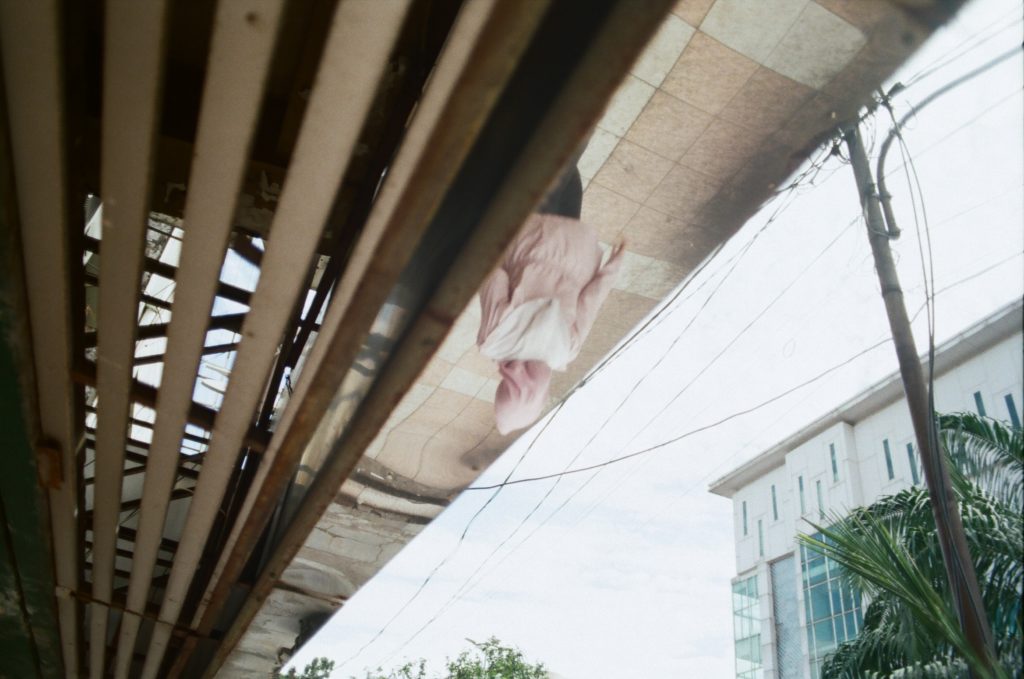
Moving forward with mental health advocacy
The stigmatisation and politicisation of mental illness exist alongside the persistent failure of Indonesian governments to deliver adequate mental health care.
Indonesia’s mental health problems are significant and multi-faceted. First of all, the Indonesian government is still racking up data on the mental health needs of the population. The Indonesian 2018 Basic Health Survey (Riskesdas) conducted by the Ministry of Health estimated that 0.67% of Indonesian households have at least one member with psychotic disorders. Moreover, an estimated 6.1% of the population aged 15 years and older were categorised as having depression. Seeing that even less-severe depression is still correlated with lowered work performance, with a working age population of over 180 million people, such figures are a large problem for Indonesia’s ambition to make use of its “demographic bonus” to boost economic productivity.
Gross human rights abuses against people living with severe mental disorders are still prevalent in Indonesia, of which pasung, or shackling, is a part. The international attention attracted by shackling has seen the “Indonesia Free from Shackles” (Indonesia Bebas Pasung) program become widespread, bringing in global human rights observers such as Human Rights Watch, international journalists, domestic and global mental health proponents (mostly academics and health professionals), as well as NGOs and CSOs, such as KPSI and KKI (Kelompok Kasih Insani), to name a couple.
The call for better data on pasung has resulted in its being incorporated in the 2013 and 2018 Basic Health Survey as well as the Indonesian Healthy Family Index (Indeks Keluarga Sehat). These Ministry of Health data have revealed an urban–rural disparity in the magnitude of the problem. While 10.7% of those urban households with a member living with psychotic disorders have had one member who has experienced pasung in their lifetime, in rural areas the rate is 17.7%. Even then, mental health advocates have low confidence in these figures, because survey respondents often under-report the prevalence of shackling due to stigma, and because the high occurrence of “re-shackling” of patients who had been temporarily freed.
The widely-publicised problem of shackling is symptomatic of the reality that access to quality services for mental healthcare is still very weak. The 2018 Riskesdas survey shows that while 85% of people living with psychotic disorders have had a history of treatment, only half of them routinely received medication. Meanwhile, for depressive disorder, only 9% of the population group received medication for their conditions.
Inequality in the variety and quality of psychiatric medications between urban and remote areas is a major problem. During a recent visit to Ende, East Nusa Tenggara, I spoke to Dr Muna Fatma, a dentist and head of the local Health Office (Dinas Kesehatan), who confirmed this. The city- and district-level procurement of psychiatric medicines is still dependent on central and provincial government’s stocks. The problem does not lie on the lack of financial capacity, but the limitation for community health centres (Puskesmas) to procure psychiatric medicine through e-catalogue access—which is the only avenue for most forms of procurement by a governmental institutions. “Puskesmas [Pusat Kesehatan Masyarakat or community health centre] also have capitation funds, which can be used for procurement of pharmaceuticals, but the e-catalogue access is locked for them. Meanwhile, public-owned health facilities are not allowed to spend state budget outside of the e-catalogue system.” Those who suffer are the families in remote areas who have a family member living with severe mental illness—whose only reliable access to healthcare is through the Puskesmas.
This inadequacy in access to care and medication helps perpetuate the mistreatment of people living with mental illness. When a freed pasung patient relapses due to poorly-medicated psychosis, terrified family members and neighbours, left to their own devices, might re-shackle the patient. Father Avent Saur of KKI, an NGO working on mental health in Flores, thus insists that people should not view shackling uni-dimensionally as a malevolent act. “I understand why families would want to shackle their family members,” he said, stressing that a better approach would be to first fortify the access to community-level medical care and pharmaceutical availability under JKN, the national universal health care scheme.
In urban areas resources are also stretched, but for different reasons. Dr Nova Riyanti Yusuf, or Noriyu—a psychiatrist, novelist, and current DPR member from the Democratic Party—told me that in the major urban health facilities, available psychiatric medications are of high quality. “In the Grogol [Soeharto Herdjan] Mental Hospital, Jakarta, the medicines stocked there are top of the line!” She then listed down many patented, latest-generation drugs, all available and fully covered by JKN for members who seek care in health facilities in the major cities. She also provided the context that in the rural and remote areas, the problem is not simply procuring the psychiatric medicine, because availability of psychiatric medications should be directly dependent on the prescribing competence of the clinicians in the local health facilities.
However, she added, this ready availability of medication in the urban areas is also going to worsen the JKN’s ballooning expenditure and thus its deficit. “In the urban mental health facilities [like Grogol Mental Hospital], each outpatient visit would incur Rp1.5 million (A$150) in JKN expenditure for a month’s worth of medication. Let’s say each day there are 100 outpatient visits in the hospital. That’s Rp150 million (A$15,000) per day, only in one mental hospital!”
The problem of overspending in cities and deficient services elsewhere is true for many healthcare issues, and is not limited to mental healthcare. As I wrote at New Mandala in February, JKN’s pool of funds is currently in a dire state, with continuous deficits, a dependency on state funding, and a lack of participation from Indonesians who are healthy and affluent.
Amid these financial challenges, JKN’s coverage of mental health care is actually diminishing. For instance, ever since JKN’s commencement, the system’s managing agency BPJS Kesehatan ruled out coverage for patients admitted to hospital due to self-harm, including suicide attempts and drug addiction. In December 2018, BPJS Kesehatan extended this exclusion to victims of violence, including domestic violence. Superficially this might be a good decision to save fiscal space, but it is short sighted and devoid of a comprehension of mental health issues as being multifactorial and developing over long periods of time.
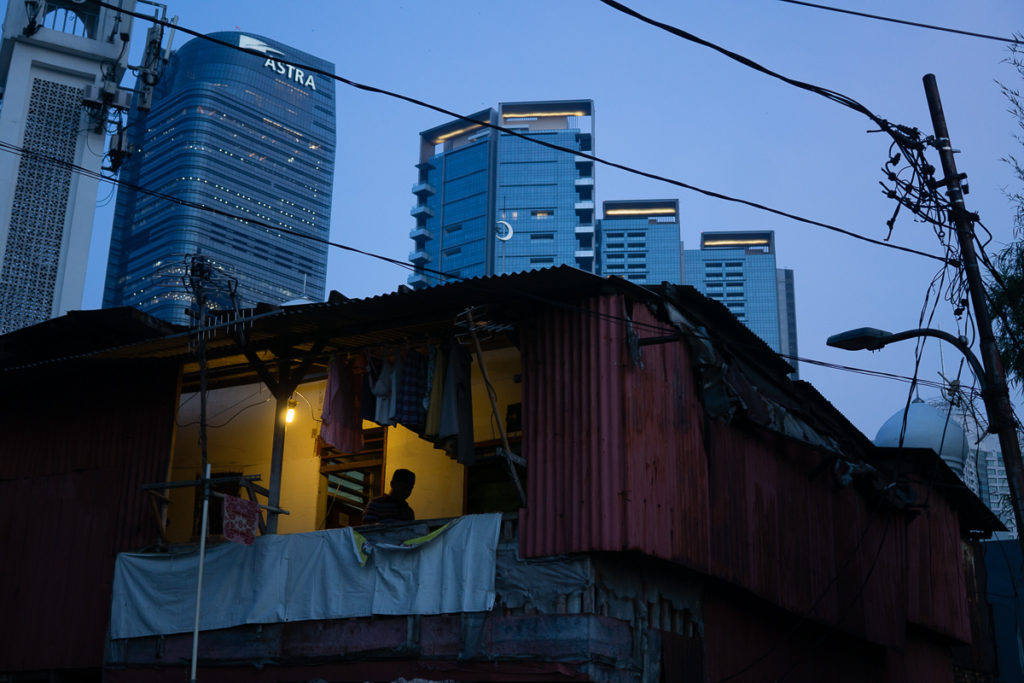
Fixing the mental health care system
The 2019 election was successful in keeping mental health issues an aib—a shame—for the nation. However, politicians could take notes from Sandiaga Uno’s campaign and learn that supporting mental health advocacy can be a political opportunity. This includes newly elected parliamentarians members and Jokowi’s future cabinet: given that Jokowi has declared a focus on human capital development for his second term, addressing mental health issues should be a policy priority.
The problem, however, is that mental health is currently not the populist’s issue of choice in Indonesia. This is in contrast to other countries which have established Universal Health Coverage (UHC) schemes for their citizens, such as Australia or the UK, and where mental health care has been a recurring issue in elections.
Bagus Utomo from KPSI realises this, too. He wants KPSI and other mental health activists to focus on building grassroots demand and “market creation” for mental health care, so that the issue gains political weight for Indonesian voters. Although KPSI still struggles with their meagre financial resources, they are committed to buying advertising space on Facebook to promote their fan page. Democracy, in their eyes, is something to be leveraged for advocacy.
The post-election challenges for Indonesia’s feminist movement
Progress for pro-women policy requires being honest about the social and political barriers activists face.
But not much has been done beyond the ratification of the Law. Apart from a 2017 Health Minister’s Regulation (Permenkes) about the post-shackling management of mental health patients, there is an absence of supporting regulations. Noriyu—the psychiatrist and DPR member—is all too familiar with this problem. A draft for a Governmental Regulation (RPP) on Mental Health, which would give practical effect to many of the law’s provisions, has been in active discussion ever since the ratification of the Law, but it is yet to be finalised. “The ball is no longer in the legislators’ court,” remarked Noriyu. “It’s in the executive’s.” Without new regulations, Indonesia’s mental healthcare governance will remain unchanged.
For a sensible public policy to promote public mental health, Noriyu emphasised the need to pay close attention to the new cabinet appointment for Minister for Health, and following that, the head of the Mental Health Directorate within the ministry. “We need to be aware of who we’re partnering with (when talking about the RPP) on their inside. We need to know what their track record is like…Have they been part of public mental health movement? Do they understand policy?…(If legislators) have sparring partners who don’t understand it, that’ll make the discussion tough.”
Beyond the administration’s policies, however, mental health advocacy should also grow. As a nation, we have to admit our failures in upholding the dignity of our weakest: those afflicted with severe mental illnesses. We have been harming them with our flawed policies. But even more sadly, we harm them more during the elections in which we seek our leaders.
This must change. But change will not come if Indonesian bureaucrats, legislators, and journalists keep exploiting the mentally ill, instead of standing up for their human rights, actively removing the stigma attached to them, and using their power to promote sensible mental health policies.
 Facebook
Facebook  Twitter
Twitter  Soundcloud
Soundcloud  Youtube
Youtube  Rss
Rss 